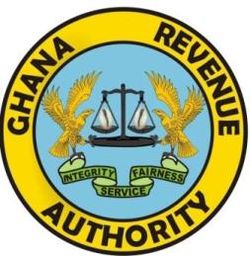Ghana Revenue Authority

Logo of Ghana Revenue Authority (GRA)
|
|
|
Large Taxpayer Office, VAT House Ring Road Central |
|
| Agency overview | |
|---|---|
| Formed | 2009 |
| Preceding agencies |
|
| Headquarters | Off Starlets' 91 Road, near Accra Sports Stadium 5°33′06″N 0°11′31″W / 5.55153°N 0.19194°WCoordinates: 5°33′06″N 0°11′31″W / 5.55153°N 0.19194°W |
| Motto | Integrity, Fairness and Service |
| Agency executives |
|
| Parent agency | Ministry of Finance |
| Website | www |
The Ghana Revenue Authority (GRA) is the Ghana administration charged with the task of assessing, collecting and accounting for tax revenue in Ghana. The core mandate of the Authority is to ensure maximum compliance with relevant laws in order to ensure a sustainable revenue stream for government as well as the controlled and safe flow of goods across the county’s borders.
As part of efforts to improve compliance, the Authority is required to assist taxpayers to understand and meet their tax obligations by providing robust and comprehensive advice.
Since its inception the GRA has integrated the three revenue institutions namely the Customs, Excise and Preventive Service (CEPS), the Internal Revenue Service (IRS), the Value Added Tax Service (VATS) and the Revenue Agencies Governing Board (RAGB).
In December 2009, the three revenue agencies that is CEPS, IRS, VAT Service and RAGB Secretariat were merged in accordance with the Ghana Revenue Authority Act, 2009 (Act 791). GRA thus replaces the revenue agencies in the administration of taxes and customs duties in the country.
GRA has been established to amongst others integrate the management of domestic tax and customs duties as well as modernise domestic tax and customs operations through the review of processes and procedures in revenue administration with information communication technology (ICT) as the backbone.
The establishment of the GRA is part of the reforms in revenue administration of tax collection in Ghana which began in the mid-eighties when CEPS and IRS were taken out of the Civil Service and made semi- autonomous and self-accounting public sector institutions with separate boards. The National Revenue Secretariat (NRS) was set up to formulate revenue policies, manage tax reforms and supervise the activities of CEPS and IRS.
In 1998, the VAT Service was established to administer VAT and other consumption taxes. RAGB also began operations in 2001 to supervise and monitor the operations of the revenue agencies. In 2002, the Taxpayer Identification Number (TIN) was introduced to enhance information interchange and risk profiling. Then in 2004, the Large Taxpayer Unit (LTU) was set up to operate on functional lines as a pilot programme for the future integration of tax administration in Ghana as well as to serve the needs of large taxpayers as a one-stop-shop operation.
It was envisaged that the integration of the revenue agencies will bring the following benefits to taxpayers and the revenue administration.
A nine member governing Board of Directors, consisting of both public and private sector experts, makes policy decisions to be implemented by GRA Management. The Board also makes recommendations to the Minister of Finance on tax policy, reforms and legislations.
The Chairman of the Board as well as the Chief Executive Officer of the Authority called the Commissioner-General are appointed by the President of the Republic of Ghana.
...
Wikipedia
